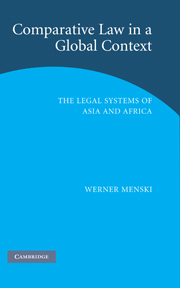Conclusion: towards global legal realism
Published online by Cambridge University Press: 09 November 2009
Summary
Building on earlier pluralist models, this study began life in its first edition as an elaborate argument for greater recognition of socio-cultural factors in relation to law and global legal analysis. In its revised incarnation, this argument has been enlarged and modified to include more explicit emphasis on the need to perceive all law as constantly changing and inherently dynamic processes rather than merely a more or less static collection of rules. While law is about rules, it is also about their immensely diverse application in human societies. Consequently, the present study developed in Part I an interactive triangular model of law (chapter 3, section 3.8) centred on legal pluralism as a complex, constantly contested amalgam of state law, values/ethics/religion and socio-cultural norms. Analysis of the legal systems of Asia and Africa strongly confirmed the global presence of such simmering conflicts and tensions in various culture-specific manifestations.
One major dilemma exposed through such pluralist perspectives is that law can probably never fully satisfy all expectations. Law everywhere is constantly involved in negotiation, over time and space, so that it becomes virtually impossible to envisage such interactions in graphs on paper, which tend to give static impressions and do not bring out the inherent dynamism and volatility of legal processes. Nevertheless, towards the end of this chapter, a further graphic model is introduced to illustrate the complexity and fluidity of law as a global phenomenon.
- Type
- Chapter
- Information
- Comparative Law in a Global ContextThe Legal Systems of Asia and Africa, pp. 594 - 613Publisher: Cambridge University PressPrint publication year: 2006



